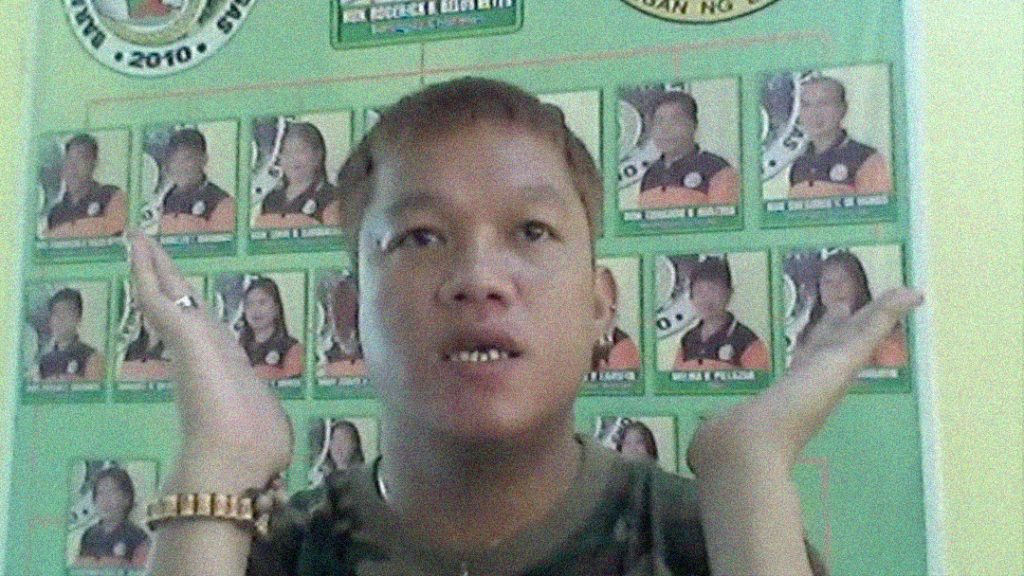This is part of #KaraniwangLGBTQIA, which Outrage Magazine officially launched on July 26, 2015 to offer vignettes of LGBT people/living, particularly in the Philippines, to give so-called “everyday people” – in this case, the common LGBTQIA people – that chance to share their stories.
As Outrage Magazine editor Michael David C. Tan says: “All our stories are valid – not just the stories of the ‘big shots’. And it’s high time we start telling all our stories.”
Reymar Riano – 30 years old from Baragay Navotas in Balayan, Batangas – has always been gender non-conforming. “I used to join beauty pageants,” he said. But even if – for a period of his life – he presented himself as a stereotypical woman, “I wouldn’t say I’m trans; maybe I’m gay.” Reymar basically changed the way he looked because “I got bored with having long hair (and presenting myself as a woman).”
Looking back, though, “in elementary school, I already liked wearing short shorts, and my favorite color was pink. In high school, I learned how to put on make-up. I also learned how to fix my classmates’ hair.”
He was, in a way, lucky – at least at home.
The sixth of nine kids, he was somewhat accepted. “My family didn’t react badly to me being gay. They immediately accepted me,” he said. “Perhaps because when I was younger, when I was in high school, I already helped doing chores, like the laundry, cooking for everyone… They didn’t reprimand me; or even asked me about this. Instead, I got asked: ‘What gifts do you want us to buy for you?’ Of course I told them I wanted Barbie, women’s blouses, and skimpy shorts. None got angry, or even asked me about this.”
CONFRONTING HATRED
The story outside his house was different, though.
“At school, people called me ‘Faggot!’, ‘Pest/Plague’, or something like that,” Reymar recalled. “They groped parts of my body. They hit me. There were times, too, when they made me grope them. I was so young then; I didn’t know anything about those things. I just wanted to enjoy myself then.”
But because of the abuses he received at school, Reymar stopped schooling for a year.
“I didn’t say anything then; I didn’t inform on the abusers,” he said. “I just told my mother and father I didn’t want to go to school anymore.”
Reymar only stayed in school to finish high school.

WORKING FOR SUPPORT
“After finishing my fourth year in high school, I immediately started working in a beauty parlor. My work then involved me fetching water, sweeping the floor, and serving as a secretary, listing down the names of customers,” he said.
Reymar is currently a beauty parlor worker, particularly a make-up artist.
“I didn’t study in college because what I wanted to do then was to immediately help my family,” he said.
For Reymar, “I think this is just fair. My siblings are now married. So they may as well give attention to their families. For me, it’s better that way.”
GENDER-BENDER
It was also while he was working in a beauty parlor that Reymar did some gender-bending.
“While there, I envied women with long hair. So I grew my hair long,” he said. I then thought: ‘What if I presented myself as a woman?’ So I started using bras, women’s clothes, and made myself sexy.”
Around then, Reymar also started joining beauty pageants (when he was 18).
“It’s fun joining these pageants. You are able to bond with other LGBTQIA people. You make people smile. You see that you make them happy while watching you parade yourself. While you parade yourself, they’re in awe of you.”
Reymar’s fave part of a pageant? The swimsuit competition. “That’s when you present yourself with no restraint; when you show that you know how to present your swimwear. That’s when you feel you’re extremely sexy.”
Looking back – and with a laugh – Reymar said he never once won the major crown/title.
“I placed fourth, third, second or first runner-up; and won other awards for the gown, swimsuit and casual wear. Maybe I wasn’t a queen material, not one who’s predestined to win.”
Joining pageants stopped eventually, particularly when younger LGBTQIA people started emerging and competing with them just seemed… impractical, Reymar said.
This part of Reymar’s gender expression also eventually ended when he worked in Cavite.
“I applied for work in a company in Cavite, and they told me to get a barber’s haircut. After then I procrastinated and didn’t grow my hair again because doing that takes time. So now, I just wear shirts… things like that. I present myself as a cisgender man, but I’m gay.”

FINDING LOVE
Reymar doesn’t have a partner now, though “there are some applicants but I’m not interested because – for me – I should focus on my family first. If the right one comes along, though, I want a serious relationship.”
And how does Reymar define being “serious”?
“You’d know if a person is really serious about you if he/she/they really want to know you very well. I want them to exert effort to visit me at home, ask me to dine out… For me at least, that’s how you know if a person is serious with you,” he said.
Reymar already had three past relationships.
The first one was a guy.
“He didn’t visit me at home, but I knew he was serious with me because he went to my workplace to ask me to eat out, and he picked me up from work to bring me to the tricycle terminal,” Reymar said.
However, “I can be mean. I get angry when my partner doesn’t greet me ‘Good morning’. That’s the first reason why we fought.”
The second one was a girl.
“She saw me working in a salon. She went to the salon even if she didn’t need a haircut; she took her friends with her, though only because she wanted to see me. So yes, we had a relationship,” he said.
This, too, didn’t work out. “We broke up because she still loved her ex-BF. I told her, ‘Go find yourself first’.”
The third one was also a girl.
“She accepted me even when I was effeminate. She fully accepted me,” he said.
The break-up happened because pre-pandemic, “there were times when I didn’t have time to chat with her, I didn’t have time for those things. We fought over those.”
When he had female partners, his parents actually – sort of – hoped he’d be able to give them grandchildren. But, said Reymar, he just tried to be “nice” and tell them that “if this happens (i.e. I get a girl pregnant), so be it.” Though, he added, he really didn’t “feel it (i.e. being with a woman).”
In hindsight, Reymar said that “maybe the girls I had relationships with just found me kind. Or maybe they were just comfortable being with me. Because when we were together, I still did as I do now. The way I talked, the way I acted… So it never crossed my mind that I’m bisexual.”
For Reymar, it’s difficult for LGBTQIA people to find love in Batangas.
“Firstly, men here are studs. Also, they’re men’s men. So you’re lucky if you find a man here who will truly love you.”

LESSONS FOR THE COMMUNITY
For Reymar – a member of Bahian Movers Club, a local LGBTQIA organization – “an issue for the LGBTQIA people in Batangas is for us to unite. This is because there are various LGBTQIA organizations. It’s better to unite so we get rid of envy, of discrediting one another.”
To younger LGBTQIA people, Reymar said they need to think first of what they want to do. “Because it’s not easy to be LGBTQIA. You will have a hard time – first of all – with people who will discriminate you. Just think: ‘This is me’. Accept yourself first.”
And to people with relatives who are LGBTQIA, “don’t hurt them or be ashamed of them. Just accept that this is where they’ll be happy. This is where they’ll have peace of mind. This is what will make them happy doing what they want to do.”
Besides, he stressed, people should “accept us because we’re also humans. We have hearts; we also feel things. Just like the way you treat men and women, accept us LGBTQIA people, too, because we were also created by God. Because even now we still don’t feel we’re accepted as humans in this world,” Reymar ended.































































